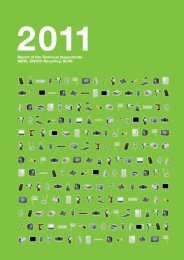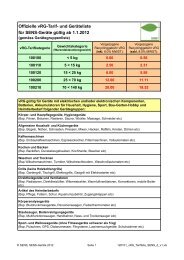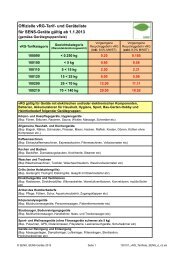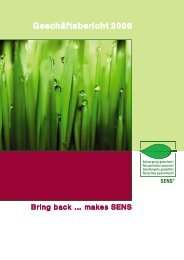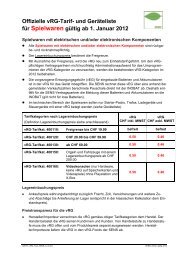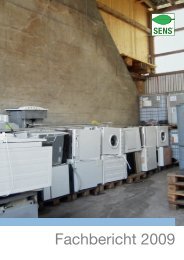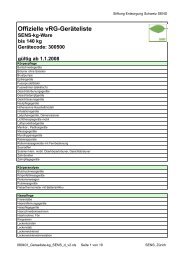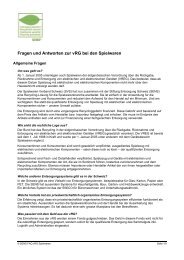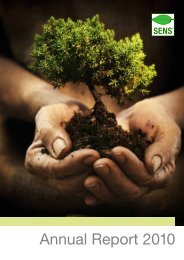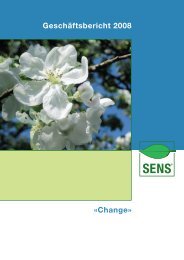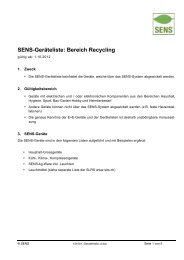Annual Report - Sens
Annual Report - Sens
Annual Report - Sens
Create successful ePaper yourself
Turn your PDF publications into a flip-book with our unique Google optimized e-Paper software.
Interview<br />
e-Recycling:<br />
money and mind<br />
Mr Varnholt, as a financial expert, how do you assess the<br />
value of natural resources?<br />
Burkhard Varnholt: Natural resources are the Achilles heel of<br />
our global existence, so recovering raw materials is just as<br />
impor tant as extracting them in the first place. In my opinion, saying<br />
that our generation is now experiencing the worst economic<br />
crisis since time immemorial is an exaggeration. Of course we<br />
face huge challenges but we should have more faith in the ability<br />
of economies to adapt. However, the crisis will certainly deepen<br />
if – and I’m deliberately expressing this as a condition – we do<br />
not succeed in reducing our fatal dependency on scarce natural<br />
resources. Resource efficiency is therefore an issue that<br />
profoundly affects us all, regardless of the industry we work in.<br />
“Natural resources are the Achilles heel of<br />
our global existence.”<br />
How can we create incentives so that using our resources<br />
efficiently becomes the normal way to behave?<br />
If nature could choose, it would use the market economy<br />
to protect itself. Resources must actually be priced according<br />
to how scarce they are if people are to change the way they<br />
behave. The problem is that the state frequently still sets the<br />
prices of resources at far too low a level. This encourages<br />
people to continue to waste resources. Take water for instance:<br />
water is far too cheap in most countries in the world, in some<br />
it is even free for the majority of the population.<br />
Do you detect a change of attitude in your business<br />
environment, a new investment mentality?<br />
Yes, definitely. In this connection we are at what the sociologist<br />
Malcolm Gladwell would call a tipping point. That means<br />
24 SENS <strong>Annual</strong> <strong>Report</strong> 2011<br />
we have reached the point at which many investors all over the<br />
world have suddenly become aware of the problem. We are<br />
poised for the transition from the era of nuclear and fossil fuels<br />
to that of renewables. The crises in the recent months and<br />
years have contributed to this: the nuclear catastrophe in Fukushima,<br />
the oil disaster in the Gulf of Mexico, the crises in the<br />
European Mediterranean countries, the global financial crisis.<br />
These events mark a turning point that has prompted people<br />
all over the world to think differently. I see investors searching<br />
harder than ever for a holistic, sustainable investment principle,<br />
and doing so in all sectors. I am convinced that in five years’<br />
time, sustainable investment will be the new standard.<br />
“I see investors searching harder than<br />
ever for a holistic, sustainable investment<br />
principle.”<br />
How do you assess the growth potential of renewable<br />
sources of energy in this context? And how do you use the<br />
scarcity of resources as a sustainable business model?<br />
Renewable sources of energy will easily be recording doubledigit<br />
growth rates in the next 10 years. Solar energy and wind<br />
power technologies will become established. What will be<br />
crucial for investors will be investing in the companies that can<br />
provide the most profitable technological products or services.<br />
“Renewable sources of energy will easily<br />
be recording double-digit growth rates in<br />
the next 10 years.”<br />
As regards sustainable investment it is important to understand<br />
that this must mean sustainable investment across the



